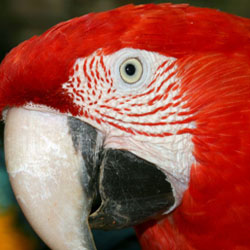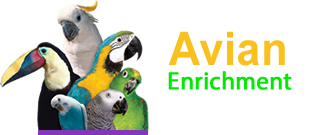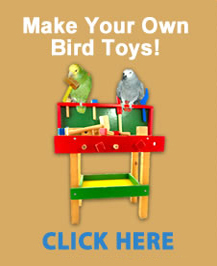Signs of a Sick Bird
 In the wild, displaying any sign of illness is not beneficial to a bird. It is instinctually very important, as a matter of survival, for a bird to disguise sickness. Often, a flock will abandon or drive off a sick bird. Birds that appear weak or ill become easy targets. Unfortunately, the instinct to hide illness also carries over to pet birds and once we notice any sign of illness it usually indicates they have already been sick for some time.
In the wild, displaying any sign of illness is not beneficial to a bird. It is instinctually very important, as a matter of survival, for a bird to disguise sickness. Often, a flock will abandon or drive off a sick bird. Birds that appear weak or ill become easy targets. Unfortunately, the instinct to hide illness also carries over to pet birds and once we notice any sign of illness it usually indicates they have already been sick for some time.
Close and careful observation of your bird's behavior, eating habits, physical appearance and droppings will all provide clues and help you to determine quickly if your bird is not feeling well. Any deviation from your birds “normal daily routine” could indicate a problem.
Things to watch for include:
- Is your parrot eating and drinking it's normal amount each day?
- Is your parrot engaging in his normal level of activity (i.e., talking, singing, preening and playing)?
- Is your parrot remaining at the bottom of its cage?
- Is your parrot sleeping more than usual?
- Has your bird's physical appearance changed?
- Are its feathers fluffed up for long periods without a reason (i.e., cold or sleeping)?
- Are its eyes partially closed or remaining closed the majority of the time?
- Are its feathers malformed? Has it had an incomplete molt?
- Does your parrot display extreme dryness or flaking of the skin?
- Has your bird's posture changed?
- Is your parrot slumped on its perch or having difficulty in perching?
- Is your bird losing weight?
- Are your bird's droppings normal (i.e., color, shape, texture, volume and frequency) for your parrot?
- Does your parrot have difficulty breathing as indicated by open-mouthed breathing or tail bobbing? Do you hear sneezing, wheezing or clicking? Is there discharge from the cere "nose" or eyes?
- Are there any signs of swelling on your bird's body?
- Is there something out of the ordinary inside the cage (i.e., blood droplets)?
Notify your veterinarian immediately if you see any of the signs above. Early detection is the key to maintaining a healthy bird. Do not waste valuable time trying home remedies, if your parrot is ill, time is of the essence. However, In some extreme instances, you may wish to apply first aid or stabilize your parrot before notifying your veterinarian.







Comments powered by CComment